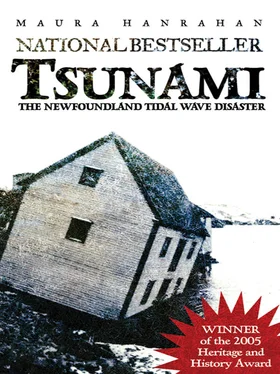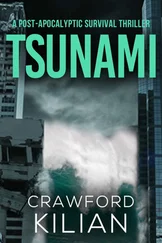“Well, for one thing, he wasn’t supposed to be home,” William explained. “He worked all over the country as a fish oil inspector and he only came home to celebrate his birthday, first time he ever did. It’s a funny thing, an odd thing.”
“The whole tidal wave is strange,” Dalton said.
“It is, sir,” William answered. “And very sad. But the saddest part of it is those that’s left behind. Lydia Hillier, Thomas’ widow, is expecting a baby any day now and she had two other young children, Caroline and little Benjamin, and she has no one to support her.”
Dalton’s face blanched at the thought. He looked at the clear sea water and his eye took in bread dough in pans sitting on the harbour bottom, as if that’s where they belonged.
William continued. “She was Thomas’ second wife and she lives with his two grown children, Harold and Georgina. Now I don’t know what’s to become of her. That was their family home, the Hilliers’—I suppose the older children can claim the house, Thomas’ grown children. They might—they aren’t too fond of Lydia, never took to her.”
Dalton silently thought of how complicated village life always was, though artists and poets might render it simple and romantic. His own visits to his father’s hometown on the Southern Shore had taught him this. Meanwhile, he wondered how many Lydias he would come across on this sad voyage.
“That’s three deaths so far, young man,” he said gently, trying to prod William on.
“Well, the worst of it is the Hilliers, not the same Hilliers as Thomas, a different family altogether,” Lockyer said. “Mrs. Lizzie Hillier had her four grandchildren with her. Irene was over for a quick visit, her mother, Jemima, said. But her daughter, Jessie Hipditch’s three were there for the night. Their house was just about there, right near the water.”
As William pointed and paused, Dalton and the men stared at the emptiness that now took the place of Lizzie Hillier’s house.
“And now they’re all gone,” William said simply. “David and Jessie Hipditch lost their three children. Poor Jessie is out of her mind with all of them gone. Her sister, Jemima, is not far behind her with the loss of her only daughter, Irene.”
“Who has lost their homes?” Dalton asked after a minute.
“David and Jessie, sir,” William answered. “On top of losing their children, they lost their home, too, though Jessie doesn’t even care about that. They’re staying with Jessie’s sister, Nan. And Henry Hillier, he’s Mrs. Lizzie’s husband—his house is gone. He’s staying with Nan, too. He doesn’t want to rebuild. He thinks he’s too old. He’s sixty-nine. He says his wife is dead and four of his grandchildren are dead. My father thinks he’s lost the will to live. And if you lose that, my father says, you’re finished.”
“Your father’s right, son,” Dalton said, stroking his chin, slowly, still surveying what remained of the Point au Gaul infrastructure. He couldn’t imagine how the people could rebuild in time for next year’s fishing season, not this close to winter, when they had enough to do to get enough wood to heat, repair, and rebuild their homes. In this part of the country they had to travel so far to get wood. He wondered when the tradition of going to winter quarters had died out here and why.
The people here had so much need of wood now, they would have to buy it. Most people didn’t have that kind of extra cash, however. Dalton had been all over the island. If Point au Gaul was like most outports, there’d be a few families with five hundred dollars or a thousand dollars in the bank or salted away in their kitchen somewhere, and another handful with a hundred dollars or two hundred dollars, but the majority would have very little or none at all, maybe twenty dollars here or there. Most of the time there wasn’t much call for money. Fish was the currency of their lives, not dollar notes. In any case, that, too, had been swept away by the big sea.
When William Lockyer and members of the Meigle crew returned in the lifeboat, Dalton walked across the deck to them.
“Lockyer,” he said. “Did you find their bodies?”
“Which bodies, Captain, sir?”
“Oh, the children, I mean, the children,” Dalton stammered. “Did you find their bodies?”
“We did, sir,” William answered. “We got Jessie’s three little ones that night and the women laid them out. But we didn’t get poor Irene for awhile. Her being missing was making Jemima’s grief all the more unbearable. We only got her body early yesterday morning. Her father, Joshua, found her washed up on the beach over there, just before you came in. He went searching every morning at dawn. He was determined to get her. Poor little thing, all beat up on the rocks like that and waterlogged. But the only thing missing was her left overshoe. She’s laid out up there now, though I think they got her covered, poor girl.”
Dalton stifled his retching. He said nothing. He tried to think of sharing a pot of tea with Cora in the breakfast room in their St. John’s home. He walked back and forth on deck as the men loaded the lifeboats with sugar, flour, and tea.
As they prepared to head into Point au Gaul again, he said, “William, you didn’t tell me about the third family made homeless.”
“Oh, it’s poor old John Walsh, Captain, sir,” William said. “He’s an old bachelor in ill health these days. All his gear and food is gone, too. He’s awfully upset. The women are trying to console him. Don’t know what he’ll do from now on…”
The young man’s voice faded away and Dalton’s sea green eyes fixed on a little house that stood with its back to the water. It’s a wonder the waves didn’t take that as a dare, he thought. He had spent his entire life on the water and had seen men swallowed by spume, crushed by sea ice, and numbed into statues by saltwater crystals. But never had he seen the Atlantic so cruel as the waves that had laced Point au Gaul that November night.
At Lamaline, Captain Dalton’s brow would finally have a chance to unfurrow a little. There, the members of the area committee sat down in the ship’s galley with the expedition personnel, all of whom were following the path taken by Nurse Cherry and the local men who escorted her. The members of the committee representing the strip of land from High Beach to Lord’s Cove introduced themselves quietly. They included C.C. Pittman, a Justice of the Peace and the committee’s chair, Father Sullivan, and Lewis Crews.
“You know about the tragedies that have visited Point au Gaul,” Pittman said slowly. “But no one has died here in Lamaline.”
“Thanks be to God,” Father Sullivan whispered.
Captain Dalton took a crumpled handkerchief from his jacket pocket and wiped the sweat off his forehead. He blinked rapidly.
“That’s not to say there isn’t a great deal of devastation,” Pittman continued. “Many stages have been damaged or swept away entirely. Dozens of trap skiffs are gone… it’s the same all along the coast, of course. And there’s even worse…”
“Yes,” said Father Sullivan, speaking with a firmer voice now. “Poor Mrs. Hipditch, Fred’s wife. She has no house anymore. It’s quite beyond repair, I can assure you of that. The family has six children—the two eldest boys have just started fishing with their father but Fred is away in Corner Brook working on the new mill there, I believe. Poor Mrs. Hipditch has lost their store, their Madeira fish, and some food as well. It’s a sad case.”
The priest lowered his grey head. Captain Dalton studied him.
“Jim Hooper, too,” Lewis Crews piped up. “Jim and Lucy, their house is all beaten up and their stage is, too. Jim is not even in good health.”
Читать дальше












